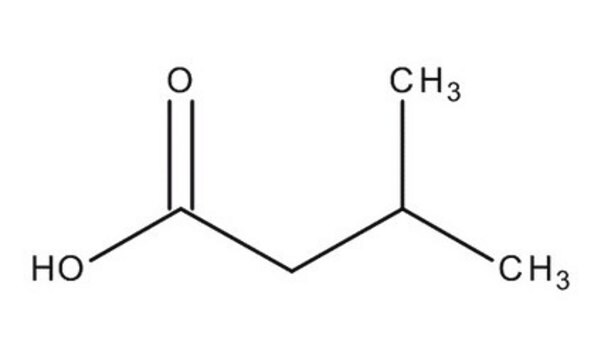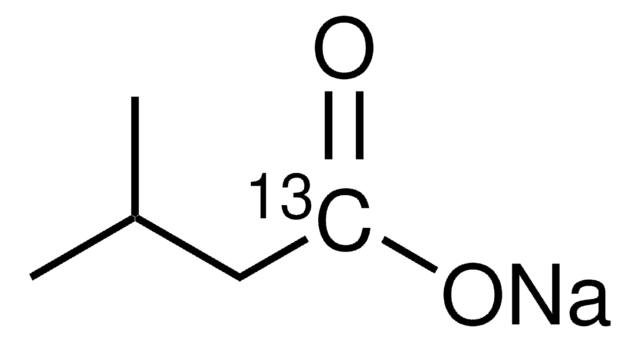78651
Isovaleric acid
analytical standard
Synonyme(s) :
3-Methylbutanoic acid, 3-Methylbutyric acid
About This Item
Produits recommandés
Qualité
analytical standard
Niveau de qualité
Pression de vapeur
0.38 mmHg ( 20 °C)
Pureté
≥98.5% (GC)
Température d'inflammation spontanée
824 °F
Durée de conservation
limited shelf life, expiry date on the label
Technique(s)
HPLC: suitable
gas chromatography (GC): suitable
Impuretés
≤0.3% water
Indice de réfraction
n20/D 1.402-1.404
n20/D 1.403 (lit.)
Point d'ébullition
175-177 °C (lit.)
Pf
−29 °C (lit.)
Densité
0.925 g/mL at 20 °C (lit.)
Application(s)
cleaning products
cosmetics
flavors and fragrances
food and beverages
personal care
Format
neat
Chaîne SMILES
CC(C)CC(O)=O
InChI
1S/C5H10O2/c1-4(2)3-5(6)7/h4H,3H2,1-2H3,(H,6,7)
Clé InChI
GWYFCOCPABKNJV-UHFFFAOYSA-N
Vous recherchez des produits similaires ? Visite Guide de comparaison des produits
Application
- Rose apple (Syzygium jambos Alston) fruit using gas chromatography with flame ionization detection (GC-FID), mass spectrometry (GC-MS) and olfactometry/aroma extract dilution analysis (GC-O/AEDA).
- Sicilian goat cheese using gas chromatography with flame ionization detection (GC-FID) and mass spectrometry (GC-MS).
- Food products using gas chromatography with flame ionization detection (GC-FID).
Mention d'avertissement
Danger
Mentions de danger
Classification des risques
Eye Dam. 1 - Skin Corr. 1B
Code de la classe de stockage
8A - Combustible corrosive hazardous materials
Classe de danger pour l'eau (WGK)
WGK 1
Point d'éclair (°F)
176.0 °F - Pensky-Martens closed cup
Point d'éclair (°C)
80 °C - Pensky-Martens closed cup
Choose from one of the most recent versions:
Déjà en possession de ce produit ?
Retrouvez la documentation relative aux produits que vous avez récemment achetés dans la Bibliothèque de documents.
Les clients ont également consulté
Notre équipe de scientifiques dispose d'une expérience dans tous les secteurs de la recherche, notamment en sciences de la vie, science des matériaux, synthèse chimique, chromatographie, analyse et dans de nombreux autres domaines..
Contacter notre Service technique










